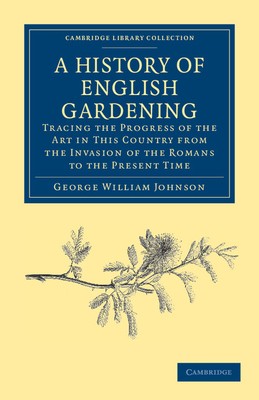
- We will send in 10–14 business days.
- Author: George William Johnson
- Publisher: Cambridge University Press
- ISBN-10: 1108037135
- ISBN-13: 9781108037136
- Format: 14 x 21.6 x 2.6 cm, softcover
- Language: English
- SAVE -10% with code: EXTRA
A History of English Gardening, Chronological, Biographical, Literary, and Critical (e-book) (used book) | bookbook.eu
Reviews
Description
In this informative study of Britain's rich horticultural history, first published in 1829, George W. Johnson (1802-66), a chemist, political economist and practising gardener, traces the history of gardening in England. He argues that the pursuit is an art which, like other art forms, developed by way of experiments and chance discoveries. The basic facts we know today, such as that vines must be watered, that plants flourish on exposure to the sun, and that animal manure helps to cultivate vegetables, all came about as a result of findings being passed down through many generations, and practice being improved through experience. Tracing the cultural importance of gardening back to biblical times, and relating it to the works of classical writers such as Hesiod, Cato and Cicero, as well as modern scholars such as Linnaeus and Banks, Johnson's work remains of interest to horticulturalists and botanists today.
EXTRA 10 % discount with code: EXTRA
The promotion ends in 12d.03:44:23
The discount code is valid when purchasing from 10 €. Discounts do not stack.
- Author: George William Johnson
- Publisher: Cambridge University Press
- ISBN-10: 1108037135
- ISBN-13: 9781108037136
- Format: 14 x 21.6 x 2.6 cm, softcover
- Language: English English
In this informative study of Britain's rich horticultural history, first published in 1829, George W. Johnson (1802-66), a chemist, political economist and practising gardener, traces the history of gardening in England. He argues that the pursuit is an art which, like other art forms, developed by way of experiments and chance discoveries. The basic facts we know today, such as that vines must be watered, that plants flourish on exposure to the sun, and that animal manure helps to cultivate vegetables, all came about as a result of findings being passed down through many generations, and practice being improved through experience. Tracing the cultural importance of gardening back to biblical times, and relating it to the works of classical writers such as Hesiod, Cato and Cicero, as well as modern scholars such as Linnaeus and Banks, Johnson's work remains of interest to horticulturalists and botanists today.


Reviews